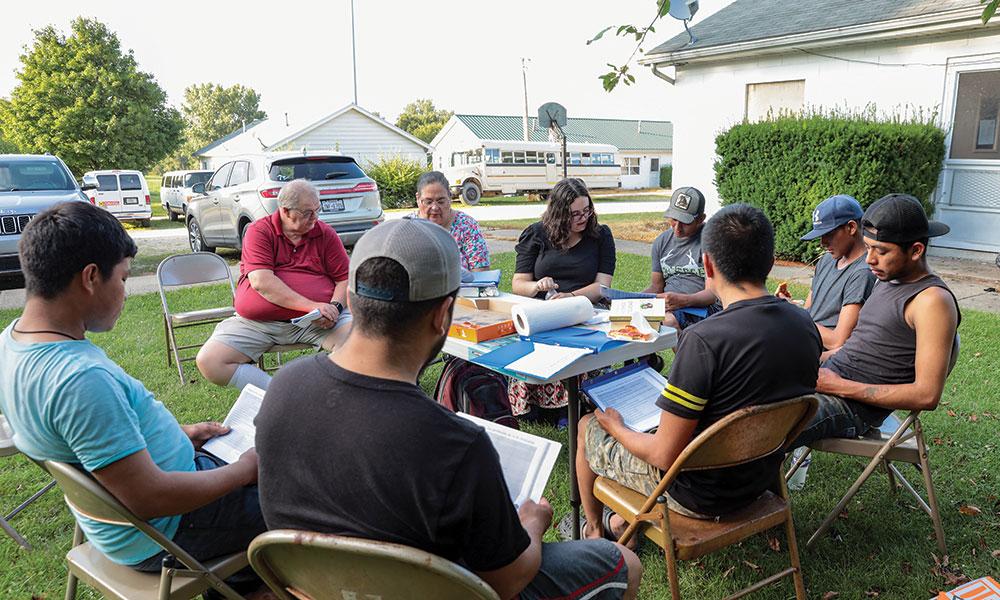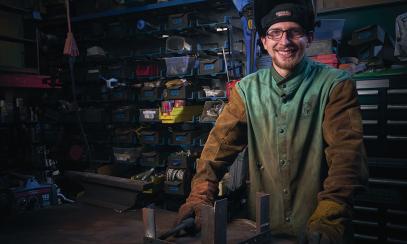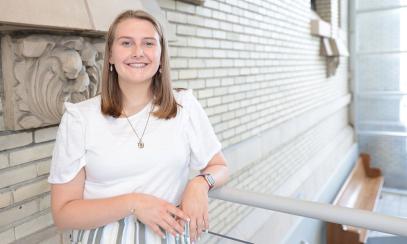
Speaking God’s Truth…With Love
For Renee Thorwall, becoming fluent in Spanish has opened up a world of ministry, personal growth, relationships and solidarity.
For Renee Thorwall, becoming fluent in Spanish has opened up a world of ministry, personal growth, relationships and solidarity.
Over the past three years, Renee has volunteered with the Diocese of Lansing’s ministry to Spanish-speaking migrant workers on Buurma Farms, located within the territory of St. Mary Parish in Pinckney. This mainly involves teaching or interpreting for adult sacramental preparation classes or outdoor Masses. Unofficially, it’s also included hours of conversation over weekly dinners, a greater appreciation of the farm laborers’ skills and grueling work, two adult godsons and a deeper understanding of how Jesus draws all people to himself in the Mass.
“I didn’t grow up in a Spanish-speaking family,” Renee says. Through high school classes and travel, she discovered she had a knack for learning it, however, and felt strongly that her gift came with a responsibility to be involved in the Spanish-speaking community.
In 2019, therefore, when she was asked to help interpret at a donations distribution for migrant workers, she went. That day, some of the workers expressed a desire to receive the sacraments, including first Communion – and Renee has been there ever since, co-teaching religion class, interpreting and filling in with anything else required of the assembled volunteer team. (There are typically about six volunteers each week, plus whichever priest is scheduled to celebrate Mass.)
Joining the mix that year – a young, single, white woman from Brighton with an office job amid dozens of adult, Spanish-speaking male migrant workers, most of them from Texas and Mexico – stretched her, she’s realized.
“My first thought was, wow, everyone has a different accent (than what she was used to hearing), and my listening comprehension wasn’t as good,” Renee remembers. “Yet I felt a very strong call – that there was a need and I should be there.”
“That first year of doing sacrament prep … I learned to be more reliant on the Holy Spirit and to reach out to people who were wiser and more experienced,” she says, laughing as she remembers her first time teaching about the Trinity in Spanish, or interpreting a homily. “It has made me a lot less afraid of being thrown in the middle of things.”
A typical Friday evening at the farm begins with dinner, after the workers wash up from a long day in the fields.
“Deacon Randy [Coffelt, from St. Mary Parish] orders pizza,” Renee says. “We eat together, and talk together over dinner, and once dinner is done we get started with class.”
This year, she has six men in her class seeking baptism, first Communion or confirmation, if not all three sacraments. The seasonal and transient nature of migrant work makes it difficult to enroll in parish-based classes that follow the school year, so, Renee says, “We’re coming to them, working with their schedules.”
It’s a simple but meaningful way to honor their work: “We speak to the dignity of workers by being present to them.”
Renee estimates about three-quarters of the farm’s migrant laborers come to the Saturday vigil Masses. “The guys who come up love that there’s a Mass [on the farm],” she says. “That’s uncommon, at least around here, [since] there’s not a ton of Spanish speakers in this region of Michigan.”
Additionally, some of the workers are from rural parts of Mexico that don’t have priests available each week, so having Mass right outside their living quarters – most don’t have access to cars while they’re in the States – is “thrilling.”
The workers who make the effort to seek out the sacraments and learn more about their faith possess a deep spiritual strength, Renee says, describing the spirituality she’s encountered at the farm: “There’s a very deep reverence for Mary. A lot of the guys pray consistently – there were two guys in my first class who before they went to work every day would pray on the field.”
“Their days are very long, and the nature of their work is extremely physically demanding,” she continues. “It’s also very hard and stressful to be far away from their families for a very long time. In an ideal world, they’d be with their family, but they’re here to help provide for them.”
Renee says the workers will often ask for prayer: “It’s especially hard when there are family members suffering at home and they can’t be there, or a family member dies. It’s very isolating.”
“They’re very devout, so a spiritual need would be to feel united with the Church,” she says. Practicing solidarity might take the form of praying together, or making confession available so they can enter more fully into the life of the Church. Worshiping at Mass together is the ultimate form of communion: “We’re all a community at the Mass.”
Her time at the farm has led to family-like bonds, including two former students who asked her to be their godmother – a Mexican Catholic tradition – when they received their first Communion at St. Mary’s. First Communions are normally a grand family affair in Mexico – it was an immense privilege, she realized, to step in for them and accompany them that day.
“Normally people might look at them, and look at us, and think we’re extremely different,” Renee says. “But the fact that we’re here together, praying together – that shows solidarity.”
“I see my call as a Christian to share my faith with others. It’s a responsibility and a joy,” she says. Knowing a second language has only widened that world of encounters. “If I have that gift, I should use it to further God’s kingdom.”



